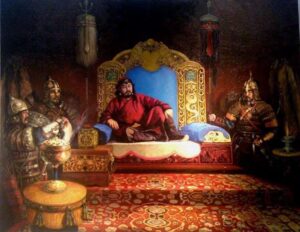This is a chapter from The Middle Ages by Karl Heyer.
We already pointed out that the idea of monarchy which came with the Mongolians to Russia, where it replaced the older Norman-Germanic elements in the social structure, had reached the more western parts of Europe earlier.
Furthermore, we quoted Rudolf Steiner as saying that after the Battle of Legnica (1241), when the Mongolians flooded back to Asia, their influence “nevertheless remained in Europe as a kind of distillation during the fifth post-Atlantean era”.
At least two influences on Europe are encapsulated here, one later, beginning in the thirteenth century, and one earlier, beginning, we may assume, in the fifth century in connection with the campaigns of the Huns. Of this earlier influence it is said that without it the idea of monarchy would never have taken hold in Europe.
The latter “distilled” influence of the thirteenth century went in the same direction and it began significantly, at the precise moment when important new beginnings of the centralised state had come into existence (such as the kingdom of Frederick II in Sicily and southern Italy) or were about to appear in the form of princely absolutism (as in the state of Philip the Fair, who destroyed the Order of the Templars).
 Thus we find in the Mongolian influence a further source from which emanated forces that shaped and formed the centralistic state of more modern times, beginning with the phase of princely absolutism. All the better do we begin to understand a statement with which Rudolf Steiner obviously wanted to indicate these connections.
Thus we find in the Mongolian influence a further source from which emanated forces that shaped and formed the centralistic state of more modern times, beginning with the phase of princely absolutism. All the better do we begin to understand a statement with which Rudolf Steiner obviously wanted to indicate these connections.
People recognise, he said, that there has to be a social life of some kind, but they cling to the Mongolian idea of an all-powerful state because they have somehow “concluded that whatever is done by the state cannot be for the good of human beings”. This important indication is further underlined by the way Steiner juxtaposed this “Mongolian” idea of the state with Wilhelm von Humboldt’s arguments on limiting the powers of the state.
As we have seen, behind the Mongolian influence that still affects social life even in modern times there lies Atlantis with its grand vision of unity gazing heavenwards to the Great Spirit and with its priest-kings who ruled the peoples with unrestricted power like higher beings. The effects of this inheritance from the distant past are still felt even in our most recent centuries. Moreover, having been present in Mongolian times, the impulses coming from Mars also live on, transformed, in the centralised states of modern Europe. Since their beginnings in the Renaissance, these states have been formed essentially to suit the requirements of their armies.
In another lecture Rudolf Steiner again spoke about the campaigns that brought the Mongolians from Asia to Europe (and also about those of the Turks). On this occasion it was the removal of the Pope to Avignon in 1303 which he connected with these events. As we have seen, the Pope’s removal to Avignon signified a strong breach in the medieval universalism of the Papal Church which had to give in to the new might of the nationalistic impulse growing in France, the impulse of the nation state that now made its entry into history.
Whatever it was that the Mongolians brought with them to Europe began to work together with the monarchic, centralistic impulse. The two appear to be linked in a hidden way. Steiner added that there was an element like a force of nature both in the nationalism impulse arising initially in France and in the influences brought in from Asia by the Mongolians and by the Ottomans.
Here, too, as in the discovery of America, an east Asian Mongolian impulse worked together with a western impulse coming in this instance directly from France, behind which lay, however, an ancient American impulse. This and the Mongolian impulse both harken back or are related to the same Atlantean source. Metamorphosed in numerous ways, what came from that source appeared again at the end of the Middle Ages because the fifth post-Atlantean era was dawning, and it is with such elements that this era will have to come to grips.
Leave a Reply